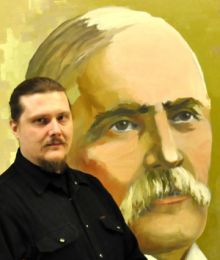The production was conducted by Mykola Vitaliiovych Lysenko, great-great-grandson of the founder of Ukrainian classical music, Merited Worker of Arts of Ukraine, artistic director and conductor of the Academic Variety-Symphonic Orchestra of Ukraine. His famous ancestor did not hear his most monumental opera during his life. Taras Bulba was for the first time performed in Kharkiv 12 years after the outstanding composer died. In the early 20th century there was no opera theater in Ukraine, who would have embodied the score. Not the least role was played by the events of 1944, when on the wave of the patriotic feelings connected with Ukraine’s liberation from fascists, the Kharkiv Theater was named after Mykola Lysenko.
The Kharkiv-based Lysenko National Academic Theater of Opera and Ballet remains the only company which has kept Taras Bulba in its repertoire for 90 years after the premiere. However, there were times when conductor Stefan Turchak, who headed the National Opera House of Ukraine, refused to go on tours abroad without Lysenko’s Taras Bulba. And he won twice: when his demands were met and when the play was triumphantly performed in Baden-Baden.
Taras Bulba as Lysenko’s legacy and his last creative will has many times acquired a symbolic meaning. One can recall the times when Taras was staged by the Tbilisi-based Paliashvili Theater of Opera and Ballet. The Georgian artists felt the heroic spirit of the music of the composer, whose muse was close to her Georgian sister. And the score of Taras Bulba probably saved life of our famous composers, such as Levko Revutsky and Borys Liatoshynsky. In the hard times of Stalinism they were on the verge of being proclaimed bourgeois nationalists, which was a kind of a verdict. Revutsky and Liatoshynsky announced that they were working on the new edition of the opera. And Lysenko had to be supported as a people’s composer, for positive example. Though under the circumstances of totalitarianism Lysenko’s role as a jeweler of the gems of people’s art was apparent, he proved that the classic music education he received in Leipzig and St. Petersburg and folklore are not different poles of professional art, but a whole thing, which consists of equally important factors.
Under “the broad wings of his soul” (expression of the poetess Dniprova Chaika) the works of most various genres, like choir, opera, chamber, and piano, were born. In all of them one could feel the vivifying breath of people’s melos, which was given new artistic qualities by the composer. One should mention two more factors of Lysenko’s poetic inspiration. First and foremost, it was Taras Shevchenko’s creative work. Overcoming the limitedness and small number of topics of the national theater, Lysenko aspired to the works by Hohol, who, according to Vissarion Belinsky, “exhausted the whole life of historical Ukraine in Taras Bulba.”
A symbolical fact is that as a youth Lysenko carried Kobzar’s coffin on his shoulders. Bidding final adieu to his great predecessor, he took over his pain for the destiny of Ukrainian people and served him with his art without big words. Maksym Rylsky described his best opera in the following way: “In his thunderous Taras Bulba / He glorified those who had courageous and invincible hearts. / With pure heart as white as mountain snow / He erected in music a people’s monument, not made by hands / Of Kobzar’s level.”
The extraordinary music event is perceived as a reason for new reflections on the destiny of the national art, in which Lysenko’s melodies he heard from the people, which organically merge with the polyphony of contemporary music, have been engraved forever.







